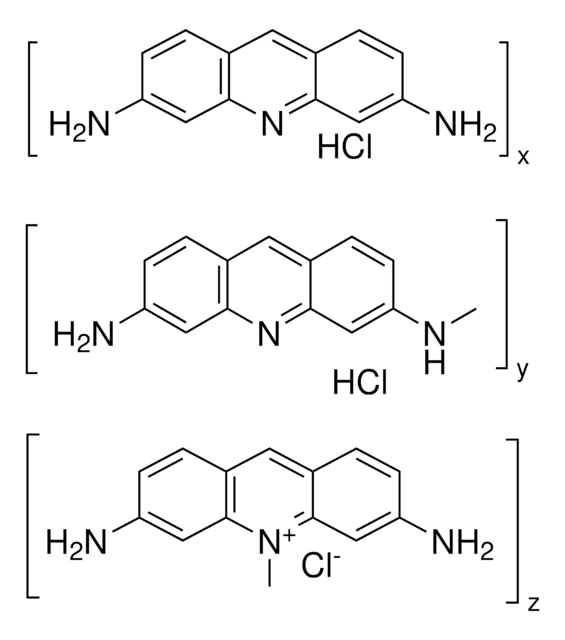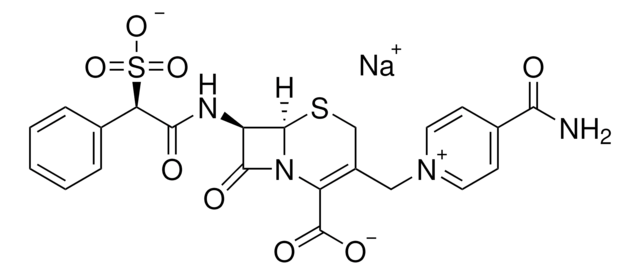01673
Acriflavine
suitable for fluorescence, BioReagent, ≥90% (AT)
Synonym(s):
3,6-Diamino-10-methylacridinium chloride mixt. with 3,6-diaminoacridine (proflavine), Euflavine, Trypaflavine Neutral
About This Item
Recommended Products
product line
BioReagent
Quality Level
Assay
≥90% (AT)
form
powder
composition
Sum of components 3,6-diaminoacridinium chloride and 3,6-diamino-10-methylacridinium chloride, ≥70% HPLC
solubility
H2O: 0.33 g/mL (lit.)(lit.)
fluorescence
λex 463 nm; λem 490 nm in ethanol
suitability
suitable for fluorescence
SMILES string
[Cl-].Nc1ccc2cc3ccc(N)cc3nc2c1.C[n+]4c5cc(N)ccc5cc6ccc(N)cc46
[Cl-].Nc1ccc2cc3ccc(N)cc3nc2c1.C[n+]4c5cc(N)ccc5cc6ccc(N)cc46
InChI
1S/C14H13N3.C13H11N3.ClH/c1-17-13-7-11(15)4-2-9(13)6-10-3-5-12(16)8-14(10)17;14-10-3-1-8-5-9-2-4-11(15)7-13(9)16-12(8)6-10;/h2-8H,1H3,(H3,15,16);1-7H,14-15H2;1H
InChI key
PEJLNXHANOHNSU-UHFFFAOYSA-N
Looking for similar products? Visit Product Comparison Guide
Application
Excitation and emission wavelengths in various solvents :
- Methanol: λex = 424 nm; λem = 518 nm
- Ethanol: λex = 426 nm; λem = 524 nm
- Propanol: λex = 430 nm; λem = 512 nm
- Butanol: λex = 430 nm; λem = 526 nm
- Formamide: λex = 434 nm; λem = 524 nm
- Glycerol: λex = 432 nm; λem = 540 nm
- Water: λex = 416 nm; λem = 514 nm
Insoluble in ether, chloroform, and fixed oils. Utilized in fluorescence steady state measurements as a donor molecule (when paired with rhodamine 6G as the acceptor) to function as a pH sensor .
Other Notes
Not finding the right product?
Try our Product Selector Tool.
Signal Word
Warning
Hazard Statements
Precautionary Statements
Hazard Classifications
Acute Tox. 4 Oral - Aquatic Acute 1 - Eye Irrit. 2 - Skin Irrit. 2 - STOT SE 3
Target Organs
Respiratory system
Storage Class Code
11 - Combustible Solids
WGK
WGK 3
Flash Point(F)
Not applicable
Flash Point(C)
Not applicable
Personal Protective Equipment
Choose from one of the most recent versions:
Already Own This Product?
Find documentation for the products that you have recently purchased in the Document Library.
Customers Also Viewed
Our team of scientists has experience in all areas of research including Life Science, Material Science, Chemical Synthesis, Chromatography, Analytical and many others.
Contact Technical Service












